IN ENGLISH
CIA, Djukanovic & Arafat’s Murder Suspect
Objavljeno prije
13 godinana
Objavio:
Monitor onlineMonitor Weekly, 18 January 2013
CIA, Djukanovic & Arafat’s Murder Suspect
Mohammad Dahlan, a former Palestinian Security Minister, whom his country’s authorities suspect of embezzling hundreds of millions of state funds, has business deals in Montenegro. He could be one of the important links between Milo Djukanovic1 and the Al Nahyan royal family of the United Arab Emirates (UAE), which the Montenegrin Prime Minister has just visited. In Abu Dhabi, Djukanovic sought salvation for Montenegro’s bankrupt economy.
This was not the Montenegrin leader’s first visit to the rich Arab kingdom. He also travelled to Abu Dhabi in 2008. On that occasion, he also had meetings with the royal family, after which big projects were announced.
According to the Palestinian media of the time, the man who connected Djukanovic with the Emirati royal family is this same Dahlan, a former close associate of Yasser Arafat and Mahmoud Abbas. During Fatah’s rule, Dahlan was one of the most powerful persons in Gaza. But after Hamas took power there in 2007, Dahlan had to leave the territory. He was then accused of attempting a coup.
Later on, Dahlan entered into a conflict with his longtime political ally from Fatah, Mahmoud Abbas, the current leader of the Palestinian state. In 2011, Abbas expelled Dahlan from Fatah.
Today, the opposing Palestinian factions – Hamas and Fatah – have something in common. Both accuse Dahlan for embezzling state funds and endemic corruption, and for immensely enriching himself. Even in the nineties, Dahlan was a regular target of public criticism. A research paper from 1997 on Dahlan – A man who swallowed Gaza – claimed that he earned his initial capital through a monopoly on the import of gasoline, which was sold at enormous prices to the impoverished population under siege.
Later on, Dahlan was accused of betraying Palestinian interests – of having close ties to the US intelligence circles and Israel’s Mossad. His opponents claim that he is a confidant of the CIA. He has also lately been mentioned in connection with the death of the PLO leader Yasser Arafat. Allegedly, Dahlan sent poison packaged as medicine to Arafat in his Paris hospital. Arafat’s body was recently exhumed amid suspicions that he was poisoned with polonium. Some traces were found on the clothes, but experts have not yet confirmed that this is the actual cause of death. Dahlan has denied all these allegations.
It is known that Arafat was in conflict with Dahlan in the last years of his life. Arafat wanted to remove him from the top positions, but Dahlan then obtained political support from Abbas, who later appointed him as minister of security. It is believed that Americans helped bring this about.
In some documents compiled by Monitor, but also in the Middle East and Western media, one can read that Dahlan intends to invest his money in Montenegro, in real estate deals.
Dahlan and Yasser Mahmoud Abbas, one of the sons of the Palestinian leader Mahmoud Abbas, entered Montenegro almost simultaneously, at a time when the two Palestinian politicians were still closely cooperating. Two years after Montenegrin independence, in April 2008, Dahlan registered in Podgorica the Levant International Incorporation. It is interesting that the representative of this company is Diana Buttu, the well known former PLO spokeswoman, whom the US President George W. Bush praised “because of her tendency for compromise.” Buttu is, otherwise, a long-time lawyer of Dahlan’s.
A few months later, in August 2008, Dahlan registered another company – Manarah Holding Montenegro. While Levant was registered for consulting and management, Manarah was established for developing real estate projects. Both companies are on the same Podgorica address at the George Washington Street. The apartment of approximately 80 square meters is owned by Levant, according to the Real Estate Directorate . The Executive Director of Manarah is Bassil Jabir, who also heads companies with the same name on multiple other addresses: Virgin Islands, Abou Dhabi, Cairo and Panama (more details in Box 1 below).
Yasser Mahmoud Abbass, in turn, started operating in Montenegro in February 2008. The younger Abbas registered two companies in Podgorica – Falcon General Investments Company and First Option Conctruction Project Management co. Both firms are registered at the same address, as the firms of Dahlan’s noted above.
The son of Mahmoud Abbas is mentioned in several documents as a controversial businessman linked to corruption and to persons on the Interpol arrest warrants. Dahlan, himself, accuses Abbas’s sons of profiteering through exploitation of their father’s authority and relationships.
A document from July 2012, ‘Chronicle of Cleptocracy (corruption within the Palestinian political establishment)’- presented in a recent testimony before the US Congress, points at several politicians who have embezzled huge Palestinian funds, including Abbas senior, his sons and Dahlan. It describes the conflict that broke out between Abbas and Dahlan, and states that Dahlan has ties with Montenegro and several other countries, including Egypt and the Emirates.
According to several sources, since 2008, when his star began to pale in Palestine and Gaza, Dahlan spends most of his time in Cairo. He is thought to be associated in multiple ways with the Saviris clan developing, among others, a project of more than a billion euros on the Montenegrin Lustica peninsula in the Kotor Bay. Saviris and Dahlan’s associate Mohammed Rashid are together in the firm Monte Mena, registered in Panama (see Box 2 below).
According to several reports, Dahlan’s return to power is desired by certain circles in the US. The reports also state that Dahlan enjoys political backing from the United Arab Emirates. Presumably, Palestinian leader Mahmoud Abbas is seriously concerned that this support may affect the financial aid that Palestine is receiving from the Arab brethren, and that a reduction of such aid could strengthen Dahlan in Palestine. These reports and a number of our sources claim that such scenario would be welcomed by the CIA leadership.
Do these same circles look favorably at the links between Dahlan and Djukanovic? It’s hard to get an answer, but the fact is that, when it comes to Palestine, Montenegro is moving away from the European strategy. Recently, Montenegro abstained from the vote on Palestine in the United Nations, thus pandering to Washington but repudiating our European partners.
In any case – money from the Emirates would come handily to Djukanovic, who did not arrive by chance to the royal palace in Abu Dhabi one December night. In late 2008, Palestinian media disclosed the news: “Dahlan is in Abu Dhabi with the Prime Minister of Montenegro. He was seen in the lobby of the Emirates’ royal palace two nights ago with the dodgiest characters one can imagine. The story is this: He is there to arrange real estate deals for the Abu Dhabi royal family in Montenegro and receive a fat fee as the middleman.”
Following the visit, Montenegrin media wrote that the royal family has expressed interest in a number of projects, including the Long Beach in Ulcinj, Shipyard Bijela, First Bank2 … Afterwards, nothing happened at all. A company from Emirates, presumably backed by the royal family, submitted a bid at the tender for the sale of the Shipyard, but the deal was not concluded because of an alleged failure to comply with the tender conditions. Was that really the reason or was the problem the fat fee? According to one version, the entry of Emirate companies in Montenegro was conditioned by the bailing out of the First Bank in which the Arabs did not want to engage because of the bank’s huge financial liabilities and problematic loans.
What will happen now – in the midst of this great crisis? Could Djukanovic be preparing to lower the price for whatever still remains for sale – the Long Beach, Ada Bojana, Valdanos3 …?
Let us be clear – serious investors from the Emirates could indeed contribute to the recovery of the Montenegrin economy. It is not a secret that their free and safe capital is seeking new opportunities and investment destinations. But, will the recent Chief’s travel and direct negotiations with the Al Nahyan family benefit Montenegro? It depends on whether Djukanovic and various middlemen, such as Dahlan, are ready to give up private benefits for the sake of public interest. That would be a miracle.
The Arabs are coming
Besides Mohammed Dahlan, more people with the same surname can be found in the Montenegrin commercial registry. These are Abdrabu Jussef Dahlan Shaker and Ahmed Abdrabu Dahlan Jussef. They are in the companies – Middle East Real Estate DOO Podgorica and Queens Beach Development Company. Both companies are registered for real estate business. The seat of the first is in the heart of Podgorica, in the Karadjordjeva Street, while Queens is in the Malo Brdo suburb. These two Dahlans are also active in the region. They are in Alfursan, a company established in Belgrade.
The authorized representative of the Middle East Real Estate is Janko Skuletic, who is also director of the Queens Beach. That these firms are associated with Mohammed Dahlan can be deduced from the fact that Janko Skuletic also represented Manarah Holding in some circumstances in Montenegro, as for example at the Real Estate Fair in Becici.
Janko Skuletic also represented the well known firm Solidere from the Emirates, which made an offer in late 2008 for a parcel of land in Podgorica owned by the Radoje Dakic Company, but later withdrew from the deal. “Solidere operates according to the principles of energy efficiency and sustainable development, using the latest technology”, Skuletic said at the time. Montenegrin media reported recently that the Emirates, among others, will invest in energy efficiency projects.
Recently, the Queens Beach Development Company purchased tender documents for the hinterland of the Queen’s beach in the municipality of Bar, which was confirmed by Dragan Simovic, the municipality’s vice president.
The founder of the Queens Beach company, according to the Registry of the Commercial Court, is the UAE based Hydra Commercial Investments. Based on our investigations, in 2008, this company and the Saviris’es Orascom jointly established in Abu Dhabi the construction consortium Emirates Foundation. Besides Orascom, members of the consortium are the companies Sorouh and Capital Investment. Some companies in the chain have been involved in large projects and seem to be serious investors.
Relationships with the Family
Mohammad Dahlan has also been criticized for his relations with Mohammad Rashid, who was recently condemned ‘in absentia’ by the Palestinian Authority to 15 years in prison for financial fraud. After the Arab Spring, Dahlan and Rashid have been accused for delivering weapons from Israel to the Libyan leader Gaddafi in return for huge sums of money.
Many available sources point out that Rashid is actually the Dahlan’s man of trust, through whom he performs various transactions. As Monitor recently wrote, Rashid, a former economic adviser to Yasser Arafat, is in the Montenegrin registry in four companies: Monte Mena Investments, Trust Holding, Prima Invest (which is now deleted from the registry) and Montenegro company for Real Estates, Investments and Development.
Rashid is associated with the Montenegrin Prime Minister. Dragica Mrvaljevic, director of Djukanovic’s company Primary Invest, was at the same time director of Rashid’s Monte Mena Investment. And according to the Audit Report on the First Bank for 2007, Rashid’s companies have received two loans from the brothers Djukanovic, amounting to almost 13 million euros.
As noted already, Monte Mena company is also registered in Panama. Rashid’s partner there is the Egyptian billionaire Samih Saviris, who is planning to build a complex worth more than a billion euros on the Kotor Bay’s Lustica peninsula. In the Panamian Monte Mena, one also finds close colleagues of Djukanovic’s – the ambassador Vojin Vlahovic, former longtime adviser to the current Prime Minister, and Veselin Vukotic, Djukanovic’s teacher and partner in the university business4.
Monte Mena continues to advertise through its web site a megaproject at Skočiđevojka, near Petrovac, and another one at Podkošljun, near Budva. Djukanovic’s company Global Montenegro owns 20,229 square meters of land at Podkošljun. A coincidence? It is as coincidental as the fact that Rashid’s Monte Mena in Podgorica is based in premises owned by the Prime Minister’s brother Aco Djukanovic.
By:
Milka TADIĆ-MIJOVIĆ
Milena PEROVIĆ-KORAĆ
____________________
1 Montenegrin Prime Minister or President since 1991 and Chairman of the ruling DPS party, successor to the former League of Communists. Mr Djukanovic has recently been re-elected for a new 4 year term as Prime Minister
2 First Bank of Montenegro, former small municipal bank privatised in 2006 and turned within a year into the country’s second largest bank by the Djukanovic family (PM, his brother Aco Djukanovic and their sister Ana Kolarevic), now under -going severe difficulties due to alleged gross mis-management and obscure dealings
3 Large and very attractive real estate development sites on the Montenegrin Coast near the border with Albania
Komentari
IZDVOJENO
IN ENGLISH
GRENELL’S (UN)OFFICIAL VISIT TO WESTERN BALKANS: Backroom Deals in Montenegro Again
Objavljeno prije
3 mjesecana
18 Augusta, 2025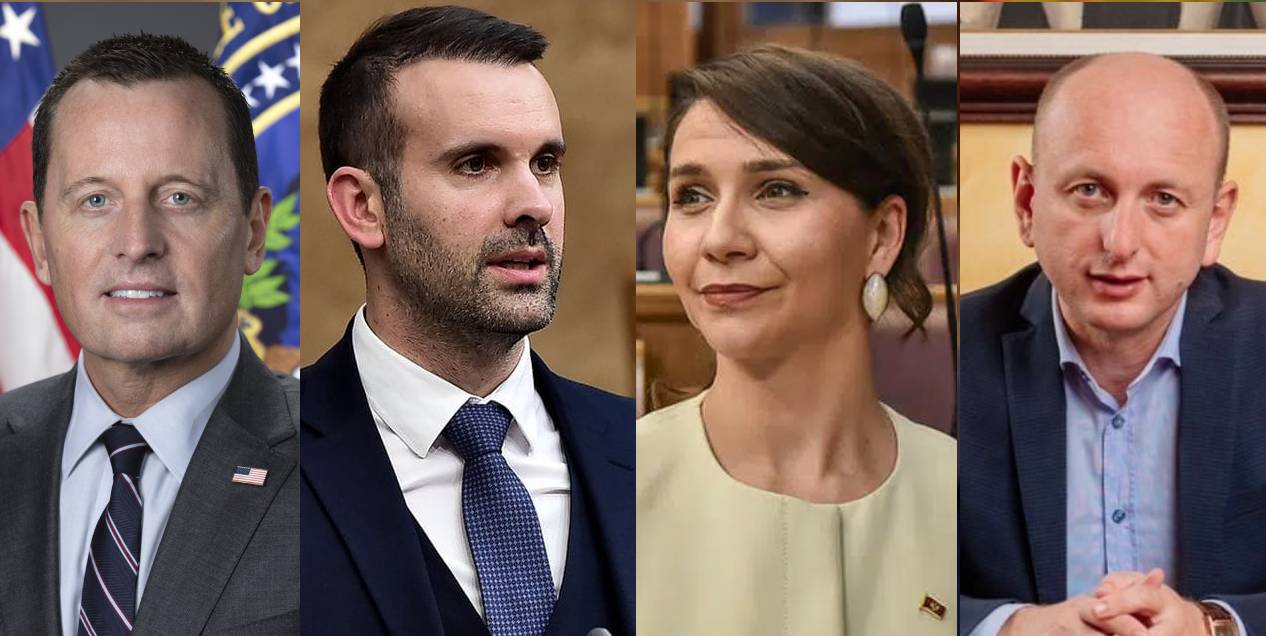
Richard Grenell, former U.S. envoy for the Serbia–Kosovo dialogue and once a powerful figure in Donald Trump’s first administration, reappeared in the Balkans this August on what was labeled an “unofficial visit.” His meetings and media appearances, however, looked suspiciously like an improvised diplomatic tour. Still, regional interlocutors who interacted with Grenell during his visit say that his vocabulary and tone sounded like that of an envoy on official mission, though he never formally claimed such a role. He even hinted, indirectly, that next year he would be back in a far more powerful position — effectively pitching himself
Last Thursday afternoon, Antena M reported that Milorad Dodik, the recently convicted president of Republika Srpska (RS), met with U.S. special presidential envoy Richard Grenell at the One and Only hotel in Portonovi, Montenegro. While authorities in Banja Luka did not confirm the meeting, it was notable that a rally organised by Dodik’s party (the Independent Social Democrats), originally planned as a protest related to his court verdict, was abruptly canceled. Antena M further reported that an unnamed Republican congresswoman was present at the meeting. No Montenegrin officials were involved or played any role in organising the encounter at the resort near the city of Herbage Novi.
However, Monitor received information, which could not be independently verified, suggesting that Grenell also met with Montenegro’s Prime Minister Milojko Spajic and Minister Majda Adzovic on the same day. Allegedly, discussions were uncomfortable and centred around recent turbulence related to airport concession deals in Montenegro. Officials close to the prime minister denied that any such meeting took place, while Minister Adzovic did not answer inquiries.
Earlier, on July 19, Nik Gjeljoshaj who simultaneously serves as Deputy Prime Minister, Economic Development Minister, and chair of the commission overseeing airport concessions informed the public that he had met with Grenell in Washington. In a statement from the U.S., he expressed gratitude to Grenell as “a great friend of the Balkan countries,” and requested support for the country’s accession toward European Union and stronger ties with the United States. During his U.S. visit, Gjeljoshaj claimed to have met in an official capacity with the FBI Director and his “senior leadership team.” Discussions were said to revolve around “the essential importance of upholding the rule of law to attract investments from Western countries and the U.S.” However, the Government publicly denied sending him and said that Gjeloshaj traveled to the U.S. privately. The Deputy PM did not provide any photographic evidence of these meetings. Before his trip, Mr Gjeloshaj was visibly dissatisfied with the tender outcome and the failure of the U.S.–Luxembourg bidder for the airport concessions that he was in favour of.
The day after the Portonovi meeting with Dodik, borba.me reported that on the evening of August 8 “in one Montenegrin coastal town”, Milan Knezevic, the leader of the Democratic People’s Party (DNP) met with Grenell. The meeting reportedly lasted nearly two hours, marked by open dialogue and exchange of of views.
The portal, considered an informal outlet of the pro-Serbia and pro-Russia “For the Future of Montenegro” (ZBCG) coalition, reported that Knezevic “detailed to Grenell the current political situation” – including internal relations in the government and various security, economic and international challenges. The interlocutors agreed “to continue communication and exchange of experiences,” with a prospect of a follow-up meeting in the future .
After departing Montenegro, Grenell continued on to Croatia. He shared on Instagram a photo of him posing with friends in the old town of Dubrovnik. The same day the Kosovar portal Gazeta Express reported that during his stay in the Western Balkans, Grenell met with Shkëlqim Devolli, a shareholder of the prestigious Devolli Corporation, founded by his father Ibrahim Devolli. Shkëlqim Devolli is a regular visitor to the U.S., often seen with influential figures like Republican senators Roger Wicker and Ted Cruz, Texas Governor Greg Abbott, and CIA Director John Ratcliffe.
Gazeta Express highlighted that the main topic of discussion was “stimulating economic growth in Kosovo through foreign investment.” It also noted that Grenell “confirmed the Trump administration’s continued commitment to supporting Kosovo and the Western Balkans,” thus promoting peace, stability, and prosperity. Just like with Knezevic and borba.me, the Gazeta Express account carries an official-sounding narrative, with the identical promise that the parties will “continue the dialogue and explore concrete ways to implement joint projects that would bring sustainable economic benefits and strengthen U.S.–Kosovo relations.” Although the location of the meeting was not disclosed, according to Monitor’s information, Grenell visited the Albanian seacoast prior to coming to Montenegro. In Albania he held a series of meetings with government officials and gave an interview to Klan Kosova – published on August 9.
Allegedly, Grenell was also seen in the region with Serbian Minister of Finance Sinisa Mali. It’s worth recalling that at the end of October 2023, Serbian President Aleksandar Vucic awarded Grenell the Order of the Serbian Flag, First Degree, for “outstanding merits in developing and strengthening peaceful cooperation and friendly relations between Serbia and the United States.” A similar decoration had been awarded to him by Kosovo three years earlier.
Still, the meetings with Albanian officials were not publicized—partly due to uncertainty over Grenell’s status, as he is on poor terms with key figures in President Trump’s administration—Secretary of State Marco Rubio and Trump’s chief of staff Susie Wiles. Grenell’s great influence during Trump’s first mandate is a thing of the past, at least for now, according to U.S. press reports. His actual job at this moment is acting director of the John F. Kennedy Center for the Performing Arts.
Regional interlocutors who were in Grenell’s circle during the visits say his vocabulary sounded as if he were on an official mission, even though he never formally said so. He also indirectly suggested that next year he would hold a significantly higher position than now, thus pitching himself in the region.
When asked whether Grenell was acting in an official capacity in Montenegro and whether it had mediated the meeting with Dodik, the U.S. Embassy in Podgorica referred Monitor to the State Department’s European desk. After the same inquiry, the State Department replied that Monitor should contact Grenell’s office directly. No response arrived prior to this publication. Unofficially, Washington sources told Monitor that the State Department had nothing to do with Grenell’s regional visit and that he was acting as a “freelance”.
Regardless of Grenell’s current status or his career’ trajectory, a big question remains as to how prepared Montenegro is for increasingly unpredictable international relations. So far, bilateral relations between Spajic’s government and the United States have not been impressive. A week ago, U.S. Secretary of State Rubio received Serbian Foreign Minister Marko Djuric—formerly Serbia’s ambassador in Washington, who built a strong Serbian caucus in the U.S. Congress. Rubio announced a “strategic dialogue with Serbia” for the end of the year. This is a process the State Department often carries out to strengthen bilateral relations. It entails high-level discussions on a wide spectrum of topics—defence, security, energy. Djuric emphasized that Serbia requested U.S. government support for issues important to Belgrade, and that his trip to Washington was significant for repositioning Serbia with the new administration. There’s no doubt that Montenegro is on Serbia’s top priorities list.
From the Montenegrin side, however, the current ambassador to the U.S. and the government seem largely indifferent to the disappearance of the Montenegrin caucus and show little effort in building strong ties with Trump’s administration. Previous head of mission in Washington, Nebojsa Todorovic, repeatedly briefed the government and foreign ministry well before the presidential elections that Trump’s return was inevitable and to prepare for it. Even President Jakov Milatovic’s visit to Ohio for the NATO Parliamentary Assembly meeting in Dayton (23-26 May), to mark 30 years of the Dayton Peace Agreement, was poorly prepared. Neither the embassy nor the foreign ministry knew that the U.S. state delegation would only be present on the first day in Dayton. Only thanks to intervention by the former ambassador did Milatovic’s delegation arrive a day earlier. That paved the way for Milatovic’s meeting with Deputy Secretary of State Christopher Landau—which, at such a gathering and outside the capital, carried considerable significance. Similar mistakes by the foreign ministry, ambassadors, and chargés d’affaires have also occurred in European capitals, with serious oversights about dates and availability of European officials.
The lack of serious diplomatic effort and narrow party interests could cost Montenegro dearly. Neighbouring countries, more skilled in lobbying, may shrewdly exploit this for their own interests—which are often at the expense of Montenegrin interests.
Jovo MARTINOVIĆ
Komentari
IN ENGLISH
Government Summons Ambassadors for Consultations and Instructions: A Foreign Policy Tightrope
Objavljeno prije
7 mjesecina
12 Aprila, 2025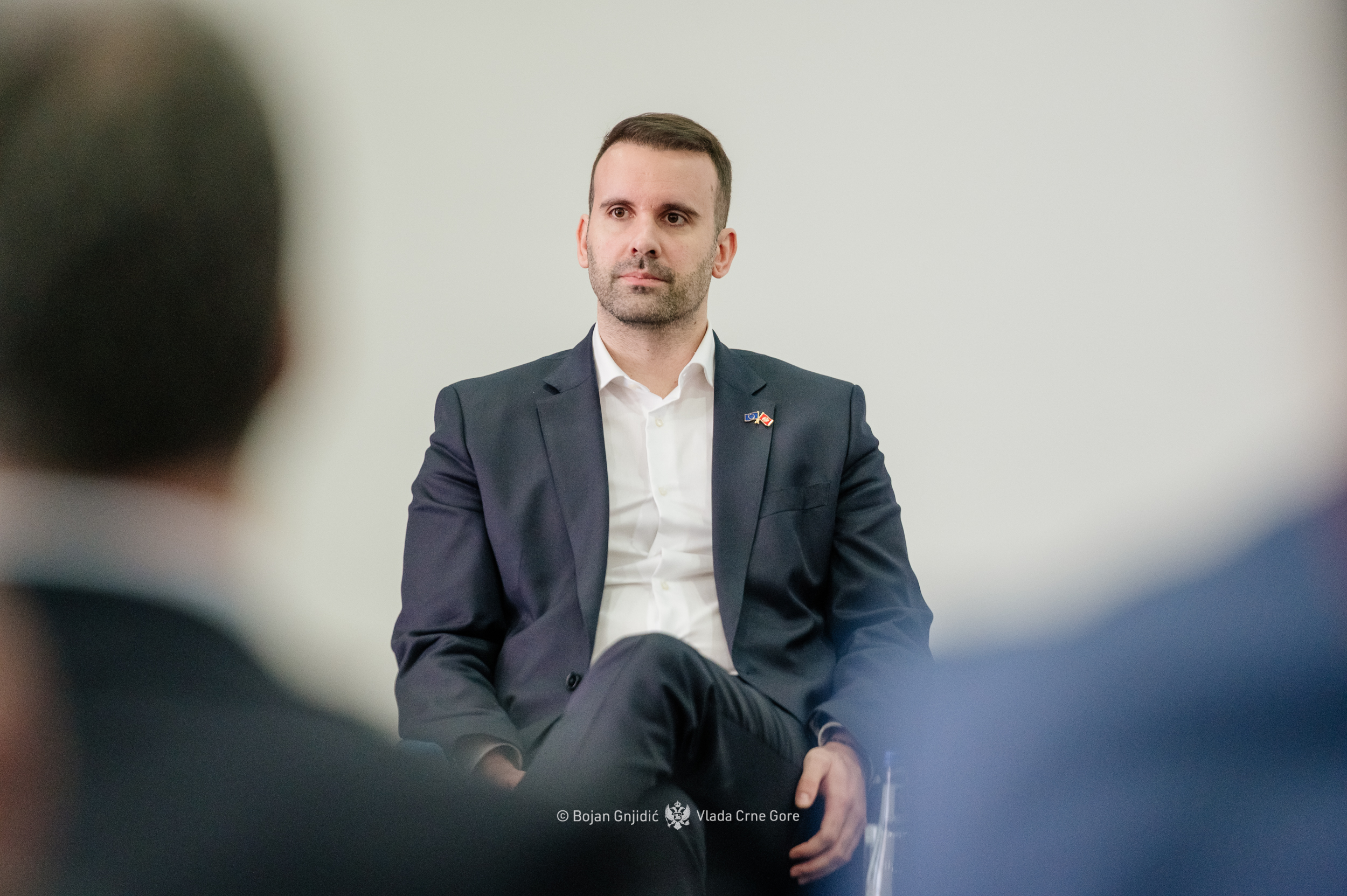
Prime Minister Milojko Spajic recently held a series of individual meetings with Montenegrin ambassadors—from Ukraine to Europe to the United States. Informal sources within the government say that during these meetings, the Prime Minister outlined a new geopolitical landscape shaped by Donald Trump’s return to power in the U.S. and evolving dynamics with the European Union
At the end of February, the Ministry of Foreign Affairs (MFA), led by Minister Ervin Ibrahimovic, summoned nearly all Montenegrin ambassadors stationed in Europe and the U.S. for urgent consultations, set to begin on March 6. The move sparked anxiety among some diplomats, who feared a repeat of the events of November 15, 2024, when three ambassadors were abruptly dismissed.
Monitor finds out that Spajić met separately with key diplomats, including Ukraine-based Borjanka Simicevic and U.S.-based Jovan Mirkovic. However, the concerns of mass dismissals proved unfounded. Instead, sources say the Prime Minister emphasized Montenegro’s continued commitment to the EU and instructed ambassadors to maintain a clear, pro-European stance. At the same time, he advised them against making any public criticisms of the United States or commenting on current rifts between the U.S. and its European allies.
Montenegro’s calibrated position became evident on March 11 at a meeting of top European military officials in Paris, where strategies for supporting Ukraine were discussed following Washington’s announcement of a suspension in military aid. The U.S. was not invited to the Parish meeting as the European leaders were keen to show they could step up independently if needed. Though an AP report initially stated that only Montenegro and Croatia, among NATO’s European members, failed to respond to the invitation, the Prime Minister’s Security and Defense Advisor, Todor Goranovic, told Radio Free Europe (RFE) that Montenegro would indeed participate. However, only the deputy military representative to NATO in Brussels attended because “Chief of General Staff Zoran Lazarevic was officially visiting Bulgaria at the time” – Goranovic explained.
Meanwhile, dissatisfaction is growing within Montenegro’s ruling coalition over Ambassador Mirkovic’s performance (or the lack thereof) in Washington. Tensions reportedly flared after a mid-February meeting with U.S. officials where he suggested that the fall of Serbian President Aleksandar Vucic could weaken some of his Montenegrin puppets. The details of the aforesaid meeting could not be independently confirmed. The subsequent report sent to Podgorica reportedly angered Spajic’s coalition partners from the former Democratic Front (DF). Although the DF was not directly mentioned in the report, its officials saw themselves as being referred to by the ambassador. One of them even retorted that those remarks would be a ground for the ambassador’s recall.
Discontent also emerged from the opposite ideological camp. Metropolitan Boris of the Montenegrin Orthodox Church (MOC) sent a protest letter to Minister Ibrahimovic, complaining that the embassy in Washington did not engage with the MOC delegation during their visit. The embassy, he wrote, failed to meet with them or assist in organizing meetings with U.S. officials. Furthermore, Metropolitan Boris complained that the embassy was “ignorant of some names and institutions that we wanted to reach out to”. He directly blamed the ambassador for the embassy’s dismissive stance.
As Monitor has previously reported, the embassy in Washington is increasingly out of sync with developments in the U.S. The once-prominent Montenegrin Caucus in Congress, which boasted 42 members under former ambassador Srdjan Darmanovic, has effectively dissolved. It’s now reduced to a single member—Congresswoman Chellie Pingree from Maine. Darmanovic had successfully lobbied to counter opposition to Montenegro’s NATO membership, despite concerns over ties of the Djukanović government with foreign criminal networks and Russian intelligence services.
Pingree reportedly sent multiple letters to the embassy criticizing the lack of engagement, but received no response. Monitor also reached out to her office twice for comment but had not received a reply at the time of publication.
Diplomatic affairs aren’t running smoothly in Europe either. In late January, the government approved the appointment of 14 new ambassadors. The list was coordinated with President Jakov Milatovic, whose signature is required for the appointments. Opposition parties and members of the pro-Serbian bloc raised objections, particularly over the inclusion of figures associated with the long-ruling Democratic Party of Socialists (DPS) and former foreign minister Milan Rocen.
One such appointee is Dragana Radulović, a longtime diplomat and former advisor to Prime Minister Dusko Markovic. She was posted to New York as Montenegro’s representative to the UN. She has been in diplomacy since 2000. Internal sources indicate that Veljko Milonjic initially hoped for the post in New York but was instead sent to Warsaw. Milonjic is remembered for his involvement in the so-called “cocaine affair” of 2015 when he was the head of Montenegro’s consulate in Munich. A truck from Munich carrying drugs under diplomatic seal was intercepted at the Austrian border. Though the Ministry of Foreign Affairs denied direct involvement, the incident cast a long shadow. Milonjic denied wrongdoing but was quietly recalled while the Consulate General in Munich was closed down. Milonjic was later appointed to a senior diplomatic post despite the scandal never being prosecuted. The truck driver, Sasha Mugosha, was sentenced to six years in prison. He was released after serving two and a half years and deported to Montenegro.
In March, the government announced that former German Bundestag member Holger Haibach had been appointed as a senior special advisor to Prime Minister Spajic, beginning January 1. Haibach will advise on regional relations in the Western Balkans and support EU accession efforts. His services will be funded by Germany’s Center for International Peace Operations (ZIF). While Haibach’s selection followed a public hiring process, sources in the diplomatic community question his current influence in Berlin. Haibach, a former CDU member of parliament, left office in 2011. Meanwhile, Veljko Kustrov, a Herzegovinian with close ties to Spajic, is considered his main point of contact in Germany.
Perhaps the most controversial diplomatic appointment so far is that of Dusanka Jeknic, a figure from the 1990s linked to the Djukanovic regime and repeatedly associated with cigarette smuggling. However, the Italian prosecutors could not present sufficient evidence against her in court. Jeknic was assigned to the embassy in Turkey after President Milatovic purchased property from her in Podgorica. Milatovic later claimed he had not been consulted on her appointment, stating that such decisions were under the MFA’s jurisdiction. He emphasized that his property purchase had been properly reported to Montenegro’s Agency for the Prevention of Corruption.
Previously, Milatovic had criticized the appointment of Predrag Drecun to lead Montenegro’s Investment Development Fund because of his close ties to the Djukanovic regime.
Montenegro is yet to drive a long and bumpy road before it gets a professional diplomatic network.
Jovo MARTINOVIĆ
Komentari
IN ENGLISH
TWILIGHT OF MONTENEGRIN INTERESTS IN AMERICA: Prayer Breakfast Instead of Real Diplomacy
Objavljeno prije
7 mjesecina
12 Aprila, 2025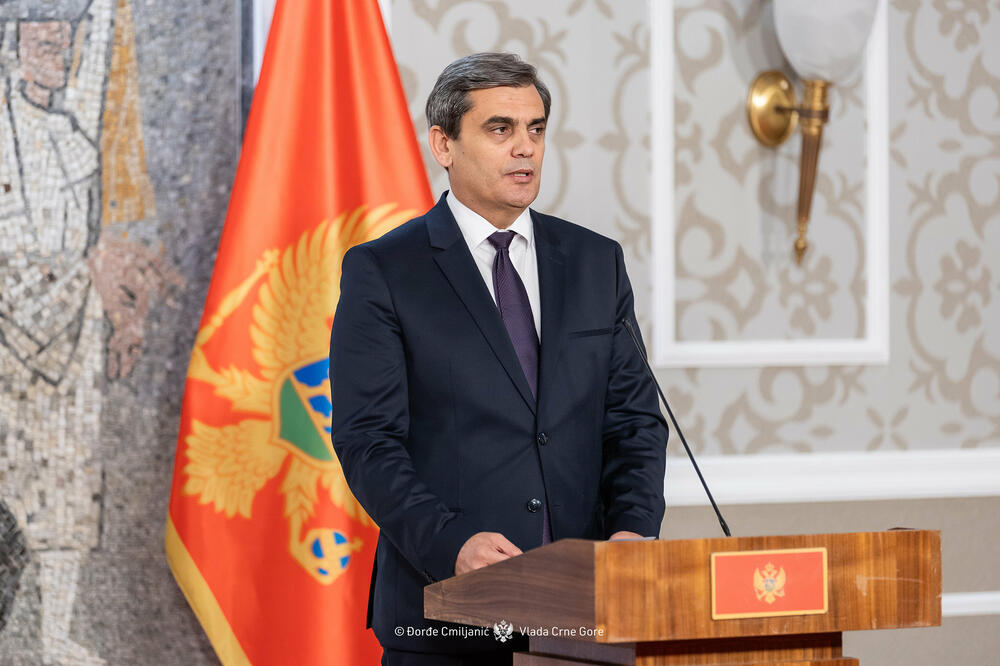
Aside from occasional trips and engagements with diaspora organizations, Montenegro shows little sign of having a coherent lobbying strategy in the United States. With the retirement of Congressman Doug Lamborn, the Montenegrin Congressional Caucus has dwindled to just one representative: Congresswoman Chellie Pingree from Maine
The 73rd annual National Prayer Breakfast in Washington recently took place, drawing more than three thousand leaders and prominent figures from politics and civil society from around the globe. Over the course of two days, participants had opportunities to network and exchange ideas at the Hilton Hotel, under the official patronage of the U.S. President.
Invitations were extended to a broad range of Montenegrin officials, including Prime Minister Milojko Spajic, Foreign Minister Ervin Ibrahimovic, Deputy Prime Minister for Economic Policy Nik Djeljoshaj, Minister of Urban Planning Slaven Radunovic, Minister of Transport Maja Vukicevic, and Minister for Human and Minority Rights Fatmir Djeka. Parliamentary invitees included many MPs, both from the opposition and the majority. Former President Milo Djukanovic and his close aide Branimir Gvozdenovic received invitations as well as several other ex officials. Also in attendance was Vijesti columnist and co-founder Zeljko Ivanovic—reportedly the only one whose travel wasn’t funded by taxpayers.
Branimir Gvozdenovic is often featured in pro-DPS (Democratic Party of Socialists) media as a regional liaison for the Prayer Breakfast. However, his name is absent from the official records of the event’s organizing foundation. Meanwhile, the Montenegrin delegation was accompanied by support staff including security, administrative personnel, and translators — necessary, since only Minister Vukicevic speaks fluent English. Translation was required for Djukanovic, Gvozdenovic and most MPs.
The cost of attending the Prayer Breakfast—including registration fees, three nights in a hotel, airfare, and daily allowances (currently €112 per day) — typically totals around $3,000 per person. When accompanying staff is added, the total bill reaches into the tens of thousands of euros. Out of the entire group, only Ministers Ibrahimović and Djeka were scheduled for official meetings at the U.S. State Department.
Minister for the Diaspora Adem Azemovic, representing the Bosniak Party, made his second trip to the U.S. in a month, accompanied by two associates. In late December, he met with Naser Nika, head of the Albanian-American Association of Staten Island. After the New Year he returned to meet him again. When asked why a second meeting was necessary, the Ministry explained that the first encounter had been brief, and the second was based on an official invitation. The association, which includes Albanian Montenegrins living in Staten Island, was praised for promoting Montenegro in New York.
Azemovic also visited the New York State Assembly, which is reportedly considering hosting Montenegro’s Independence Day celebration. His office described this as an opportunity to mark one of the country’s most significant holidays in a high-profile setting. Interestingly, Montenegro’s Independence Day was already celebrated at New York City Hall on May 23, 2024, in an event organized by the Albanian-American Association of Ulcinj. That celebration included Montenegro’s Consul Amer Cikotic and the Association’s president Dzelal Lanica. Nika had publicly criticized the event on Facebook, claiming that it misrepresented interethnic relations in Montenegro and highlighted Serbian political influence via Serbian President Vucic-backed factions.
Despite these diaspora engagements, there is little to suggest that Montenegro has any serious lobbying efforts in Washington—particularly with key decision-makers. Nebojsa Medojevic, leader of the Movement for Change (PZP), remarked that “Montenegro simply failed to grasp the magnitude and significance of political changes occurring in the U.S.”
“The current ambassador —Professor Jovan Mirković is openly anti-Trump and a personal ally of Aco and Milo Djukanovic” Medojević stated. “He has no meaningful contacts in Washington and no ideological alignment with the current direction of U.S. politics, so it’s unclear who or what he’s even representing.” He went on to question the competence and professionalism of the current government’s foreign policy team.
Interestingly, Nebojsa Todorovic, the former chargé d’affaires in Washington, had warned the Ministry of Foreign Affairs (MFA) and the government in late 2023 to prepare for a potential return of Donald Trump.
Since arriving in Washington in mid-September, Ambassador Mirkovic has maintained a notably low profile. His biography reveals he spent several years in Russia during the early 1990s—the same period when Milan Rocen was serving as minister-counselor at the Yugoslav embassy. Sources claim that Mirkovic has family ties in Russia and is known for his longstanding loyalty to the Djukanovic regime. Neither Djukanovic nor his Democratic Party of Socialists (DPS) have ever renounced their 2011 strategic cooperation agreement with Putin’s United Russia. In fact, the DPS publicly reaffirmed its pride in these ties in Parliament last year.
With the departure of Doug Lamborn—one of the Montenegrin Caucus’s co-chairs—the group now counts only a single member: Congresswoman Chellie Pingree. Meanwhile, Serbia has been actively growing its influence. Foreign Minister Marko Djuric, a former ambassador to Washington, has built up the Serbian Caucus to nearly 40 members. Djuric even boasted that Serbia, though not a NATO member, has stronger U.S. ties than Montenegro.
Some claim that Serbia pressured Podgorica through influential regional businessmen into sending a low-impact figure to Washington. The contrast with past Montenegrin diplomacy is stark: Under Ambassador Srdjan Darmanovic, the Montenegrin Caucus had grown to 42 members, surpassing even the Albanian caucus. Darmanovic worked closely with Congressman Mike Turner to gain U.S. support for NATO accession—despite Djukanovic’s regime then-notorious links to organized crime and Russian intelligence services.
Efforts to revive the caucus were briefly relaunched by Nebojsa Todorovic, who during his stint as chargé d’affaires in 2023 helped re-engage 10 U.S. lawmakers, including Turner and other influential committee chairs such as Michael McCaul and Robert Aderholt. For a brief period, Montenegro held a unique status in the Balkans, with three Congressional committee leaders in its caucus.
However, Todorovic has since been recalled, and with him, much of Montenegro’s presence in Washington has faded again into inertia.
This raises uncomfortable questions: Is Spajic’s government reverting to the old practice of conducting diplomacy through informal channels and business networks, as seen under Djukanovic and his top advisor Rocen? At the time, oligarchs like Oleg Deripaska and other Putin loyalists were reportedly enlisted to lobby for Montenegro in the West.
That line of approach came at a steep cost to the country—and its reputation.
Jovo MARTINOVIĆ
Komentari
Kolumne
-

ALTERVIZIJA / prije 1 sedmica
Koncentraciona vlada ili vlada političkog centra ( II)
Milan Popović
-

DANAS, SJUTRA / prije 1 sedmica
SPC, prva grana vlasti
Milena Perović
-

DUHANKESA / prije 1 sedmica
A vrijeme ističe…
Ferid Muhić
-

DANAS, SJUTRA / prije 2 sedmice
Nedovršeno
Zoran Radulović
-

ALTERVIZIJA / prije 2 sedmice
Koncentraciona vlada ili vlada političkog centra?
Milan Popović

Novi broj


VLAST PONAVLJA MJERE, CIJENE RASTU: Limitirana Vlada

DISCIPLINOVANJE POLITIČKIH DISIDENATA U SPC-U: Patrijarh i sinod kao ruka države

VLAST NEĆE DRAGOLJUBA DUŠKA VUKOVIĆA U AGENCIJU ZA AUDIOVIZUELNE USLUGE: Ničiji
Izdvajamo
-

 DRUŠTVO4 sedmice
DRUŠTVO4 sedmicePROCES LEGALIZACIJE BESPRAVNE GRADNJE: Probijeni rokovi
-
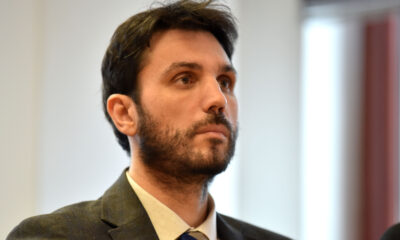
 DRUŠTVO4 sedmice
DRUŠTVO4 sedmiceSLUČAJ RTV PODGORICA: Afere vidljivije od programa
-
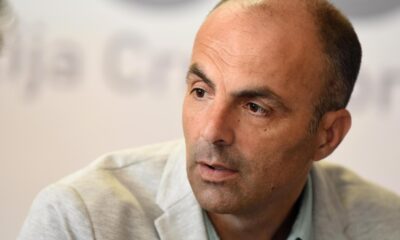
 Izdvojeno4 sedmice
Izdvojeno4 sedmiceBUDVA: KADA RUŠITELJI POSTANU DOBROTVORI: RTCG dobio na poklon filmsku arhivu uništenog Zeta filma
-
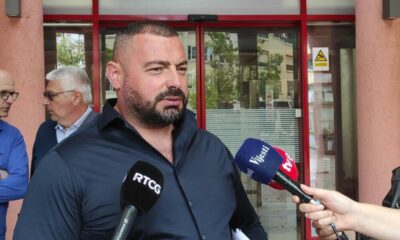
 INTERVJU4 sedmice
INTERVJU4 sedmiceVLADO LAKIĆ, UDRUŽENJE STOČARA DANILOVGRAD: Farmeri su prepušteni sami sebi
-
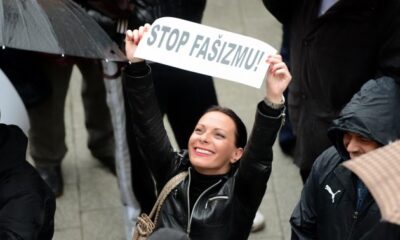
 INTERVJU4 sedmice
INTERVJU4 sedmiceANA LALIĆ, PREDSJEDNICA NEZAVISNOG DRUŠTVA NOVINARA VOJVODINE: Propagandna glasila režima fatalnija su za građane Srbije i od Vučića
-
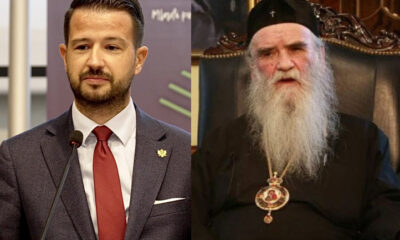
 FOKUS4 sedmice
FOKUS4 sedmicePREDSJEDNIKOV ORDEN AMFILOHIJU, POMIRITELJU: Da je vječno selektivno pamćenje
-
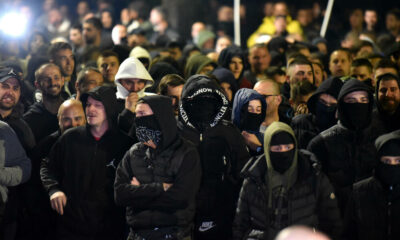
 FOKUS3 sedmice
FOKUS3 sedmicePROVALA MRŽNJE PREMA TURSKIM DRŽAVLJANIMA U CRNOJ GORI: Fašizam ne dolazi, već je došao
-

 DRUŠTVO3 sedmice
DRUŠTVO3 sedmiceISTORIJSKI REVIZIONIZAM U CRNOJ GORI I REGIONU: Put u mrak






